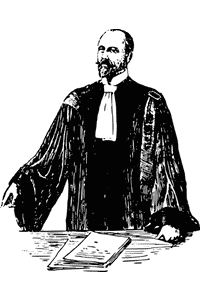Table of Contents
 Everyone is an advocate, whether you recognize it or not. We advocate for our favorite teams, political candidates and, of course, we advocate for our schools and the resources and programs vital to the success of our students. For a leader, it is one of your most important roles, so its important to know the 8 Characteristics of Effective Advocates.
Everyone is an advocate, whether you recognize it or not. We advocate for our favorite teams, political candidates and, of course, we advocate for our schools and the resources and programs vital to the success of our students. For a leader, it is one of your most important roles, so its important to know the 8 Characteristics of Effective Advocates.
Advocacy is what you do when you are actively supporting a cause such as expanding the emphasis on technology in your school. It is often compared to public relations. But advocacy is quite different, as we’ll discuss throughout the book. When leaders advocate for their program, they are committed to providing information to stakeholder groups that will build support for their vision of increased technology use. They recognize the importance of building networks and alliances that will support their efforts
Advocacy is a way to systematically press for change. It is also the foundation of our democracy and a process that allows ordinary people to shape and influence policy at all levels. Identifying priorities, crafting a strategy, taking action, and achieving results are critical steps to finding one’s voice, making oneself heard, and shaping one’s future.
Characteristics of an Effective Advocate
Once you realize you are an advocate, you want to be an effective one. There are 8 characteristics of an effective advocate.
- Always listens and learns
- Deliberate focus on long-term goals
- Values support from others
- Openness to different ways to share your message
- Commitment to partner with different and like-minded individuals
- Ability to look at and respond to positions and an issue
- Tenacity to bounce back from negative responses
- Engages the public and stakeholders
Always listens and learns
An effective advocate listens to his or her audience and learns from them. Too often, we are so focused on sharing our message that we forget to listen. Without listening, we can’t adjust as we learn about our audience’s needs.
Deliberate focus on long-term goals
You’ll also need a focus on your long-term goals. It’s easy to become caught up in the immediate situation, without recognition of long-term impact. In one district where we worked there was tension between the staff of two high schools about programs and resources when the district moved to a small learning communities model. Rather than grasp the importance of these communities for connecting students and teachers, the focus was on facilities, supplies, and materials. The local news media reported on the tension and it undermined the district’s efforts to improve the learning environment for students.
Values support from others
Third, it’s important to not limit your perspective but be open to different points-of-view. For example, your legislator does not schedule a time to meet with you. Instead, he refers you to his aide who specializes in education. Although you may feel like this is a step down, the support from a key aide can be invaluable when the legislator is seeking advice from his staff. Recognize that you need support from a variety of stakeholders and people who influence opinion.
Openness to different ways to share your message
Although we should always have a plan to share our message, we should be open to modifying our methods. For example, when meeting with a legislator, we may have a scheduled, 15-minute meeting, for which we prepare. But when we arrive at our scheduled time, we are told that she has a conflict, and that you may walk with her to her meeting, which will be about two minutes. You’ll need to adjust the way you share your message.
Commitment to partner with different and like-minded individuals
To accomplish your goals, you will need to partner with those who agree with you, and those who may not. That may sound contradictory, but if you don’t find ways to partner with those who disagree with you, you won’t accomplish your goals.
Ability to look at and respond to all positions in an issue
Next, you’ll need to assess the varying positions in an issue, so you can respond appropriately. It’s not enough to simply look at your own perspective, which may be limited. If you plan to accomplish your goal and gain support from your stakeholder, you’ll need to understand his or her perspective, in addition to yours. Otherwise, you can’t address his or her needs.
 Tenacity to bounce back from negative responses
Tenacity to bounce back from negative responses
Are you tenacious enough to cope with the negative responses you are likely to encounter? You will receive negative responses as you advocate for an issue. This doesn’t mean you will never accomplish your goals, but it does mean you will need to recover from a negative response to continue to advocate for your issues.
Engages the public and stakeholders
Finally, an effective advocate engages the public and stakeholders. If we are generally disengaged from others, we won’t get our message across. Engaging those around us means being involved with those around us. Whether that is by participating in clubs or other organizations, or by responding to blogs from possible audiences, engagement heightens your opportunity to be a successful advocate. Community partnerships, and the relationships that emerge from those partnerships, provide a critical avenue for advocacy.
Final Thoughts
Becoming an advocate is an exciting part of your job, whether you are a teacher, leader, superintendent, parent, or school board member. As an advocate, you can make a difference by creating and impacting positive change. Apply the characteristics of effective advocacy, and watch what you can accomplish.
Subscribe to edCircuit to stay up to date on all of our shows, podcasts, news, and thought leadership articles.





